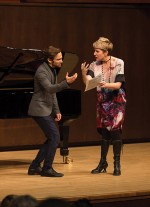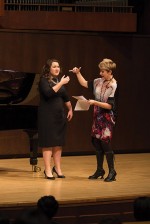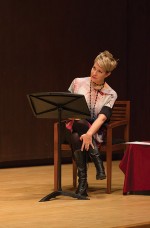Title

Joyce DiDonato and Samantha Hankey
(Photo by Rosalie O'Connor)“While she has always been a friend, we now consider her family,” Brian Zeger, artistic director of the Marcus Institute for Vocal Arts, said of internationally renowned opera star Joyce DiDonato. She was about to grace the Paul Hall stage to lead her third Juilliard master class, which took place on December 10 in between rehearsals at the Metropolitan Opera, where she was appearing as Elena in La donna del lago. At Juilliard, she worked with mezzo-soprano Samantha Hankey in “Allez, laissez-moi seul” from Massenet's Cendrillon, countertenor Jakub Józef Orlin´ski in “Vedro con mio diletto” from Vivaldi's Giustino; baritone Theo Hoffman in “Dormo ancora” from Monteverdi's Il ritorno d'Ulisse in patria; and soprano Christine Price in “Ach, ich liebte” from Mozart's Die Entführung aus dem Serail. The singers were joined by pianists William Kelley and Michał Biel.
Body
In addition to giving the inaugural Juilliard Vocal Arts live-streamed master class, in 2013, DiDonato's history here also includes receiving an honorary doctorate, in 2014, when she also delivered the year's buzzed-about commencement address (you can see it at youtube.com/JuilliardSchool). One of her many talents includes social media savviness: She routinely connects personally and artistically with a highly engaged community of followers, so we asked her to do so with our collective pool of fans before, during, and after the master class. A teaser Instagram video featured Joyce in her full La donna del lago costume; fans around the world live-tweeted the class with us using our hashtag #JoyceAtJuilliard; and after the class, we hosted DiDonato on Juilliard's Facebook page for a live Q&A, which showcased her inspiring, uplifting, and thoughtful approach to teaching, performing, and the daily exertions of performing artists. We hope she'll be back soon!
Here are a few excerpts from the Q&A; visit our Facebook page to read the entire thing.
How do you prepare for the several new opera roles you have performed? What do you do that's different when approaching these characters and music no one has ever performed before?
I go straight to the source: THE COMPOSER! I devour all the dynamic markings, articulation notations, etc., then devour the text as well—studying all I can around it. Then, it's time for the imagination to take flight! Essentially, it's the same whether it's old or new music!
How do you know when a role is wrong for your voice?
Ah, that's a good question, because sometimes singing through it at the start, even a “perfect fit” role can be a bit tricky. Tessitura is a BIG indicator for me—I may be able to hit the notes, but can I sustain that tessitura over the course of a 3+ hour evening? And what is the orchestration doing—will it support and help me, or will I be in combat with it all night?
What advice do you have for a young singer to “keep pushing” despite auditioning for several companies for summer and apprentice programs and not getting into any?
I know this is a very, very tough situation. My heart goes out to you. This is the tough part—you have to get VERY objective, and VERY honest with yourself, and try to determine the “why?” Is your voice just on a slower development track? Then you can hibernate a bit, maybe disappear from the audition circuit to figure things out, then come roaring back! Are you missing some fundamental basics? (Singing out of tune?) Then you must address those head on. Are you maybe giving off a vibe in the audition process that is a disservice to you? Then do some personal work on how you present yourself. Think of yourself as CEO of your corporation— you've just launched a product that tanked. You have to do some research and development into the WHY. THEN if you have that information, you can find the way through it. I KNOW this is not easy ... not at all. But believe me—it will help you learn SO much about yourself, that it's a scary journey worth taking! GET TO IT!
What do you think the younger generation of singers who are serious about pursuing a performing career need in relation to that idea in order to accomplish a healthy balance between musicality and stealing the hearts of our audiences?
This is the holy grail for musicians! We are always looking for ways to simplify and simply LET the music speak. That doesn't mean to be passive, by any means, and sometimes we have to exaggerate a bit at the beginning to really feel it. But this comes with time and maturity, as well. One key for me is to listen to myself—the moment I'm trying too hard, my voice betrays it immediately, and then I know where I need to start ALLOWING more, more than actively moving through phrases, etc. The other key is that if I go deeper and deeper into the subtext and emotional connection—AND THEN I TRUST IT—I can simply let it be. But I'm only just learning this now ... it's a lifelong process, my friend! So be vigilant, but be patient!
Thank you guys for being so brave in facing this world of music. I KNOW it's scary and thrilling and overwhelming and exhilarating and disappointing and awe-inspiring and deeply painful and so immensely rewarding. … But it is [also] your opportunity to learn more about yourself and about this crazy world we live in. No matter WHERE your journeys take you, trust that you're bravely facing yourself through this, and helping OTHERS to learn more about themselves, as well. It's a crazy journey, but so worthwhile! Wishing you ALL the best!








